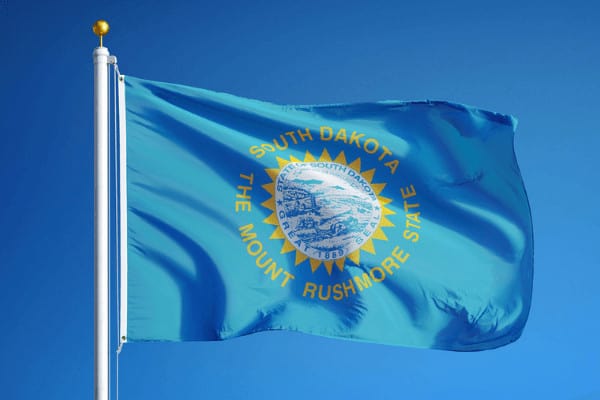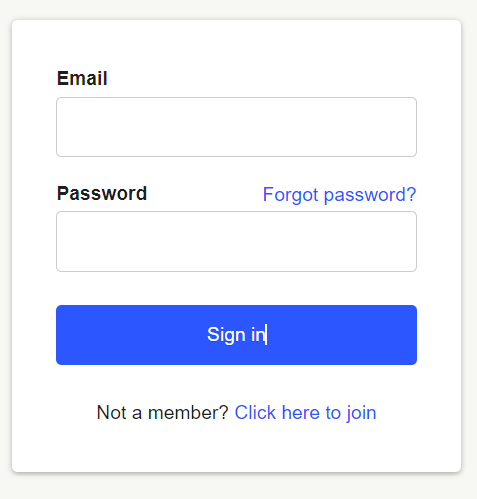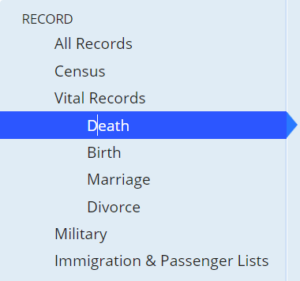
Search for Death Records in South Dakota
Free South Dakota Death Records Lookup

We receive referral fees from partners (advertising disclosure)
The information we provide you is free of charge and a result of extensive research by our product experts. We use affiliate links in our site that provide us with referral commissions. While this fact may not influence the information we provide, it may affect the positioning of this information.


The South Dakota Death Records Database may prove to be a very beneficial resource for those who are looking for death records in the state of South Dakota. Although the information you acquire will be useful in your search for death records, it also contains essential details about the deceased and their life before passing away, which will help you in your quest for death records.

Death Records in South Dakota -
The Ultimate Guide 2024
- UPDATED October 2024
South Dakota Death Records
A certified copy of a South Dakota vital record, such as a birth certificate, death certificate, or marriage certificate, can be obtained from the office of the Register of Deeds. In addition, our agency issues burial licenses and maintains burial records for each of the counties in which it is located and operates. State legislation restricts public access to vital documents such as birth, death, and marriage records. Burial records, on the other hand, are available to the public. On matters pertaining to the state’s vital records, the South Dakota Register of Deeds office works closely with the South Dakota Department of Health, which is located in the state’s capital. Additionally, the Department of Health provides copies of vital records as well as a range of other services that are critical to the well-being of South Dakotans.
The death certificates for those who died in South Dakota between January 1, 1960, and the present day can be obtained by calling any South Dakota Register of Deeds office. To request a copy of a death certificate in South Dakota, you must complete the South Dakota Vital Records Request form and submit it along with the $15.00 fee and identification. (For more details, see the section titled “Forms.”) When submitting an application, it is necessary to provide the decedent’s name, as well as the date of their death and any other essential information that may be required on the application. An official copy of the record is provided after it has been located; however, if the record cannot be found, the request is forwarded to the Department of Health for further inquiry. It will be sent a “no record” letter and the $15.00 fee will be retained as a search cost for the investigation if no record can be located.
BURIAL PERMITS
Interment permits are official documents that serve to document the burial of a deceased individual. The Register of Deeds in the county where the burial will take place is in charge of preparing and submitting this paperwork to the appropriate authorities. There is a wealth of information in a deceased person’s burial record, which includes the person’s name and date of death as well as their disposition and burial location as well as the name of the funeral home, among other things. There are no restrictions on how you can search for these papers; you can search for them in whatever way you like. Burial Permits issued in Minnehaha County have been kept on file since the 1920s and are available to the public for inspection.

South Dakota Deaths Databases

Before 1905
In the years preceding 1905, the state did not keep track of any deaths. Some county officers, on the other hand, may have records that go back as far as 1905 or even earlier in some instances. These exceptions are documented on the county pages for each of the counties in the state of California. The Bureau of Indian Affairs maintains a few early death records for Native American tribes that are part of its collection, which can be seen online. The documents from some of these collections have been microfilmed and are now available through FamilySearch Centers and libraries around the United States. If you need more information, look into the South Dakota American Indian Death Records. Find the location of the FamilySearch Center that is closest to you. If you know the approximate date and county in which the death occurred, you can look through the FamilySearch Catalog to see what information is available.
1905 to date
It wasn’t until 1905 that South Dakota became the first state to compel the registration of all deaths. After 1905, death records were sent to the State and County archives, where they can be obtained. According to state law, while each county is expected to keep a copy of death records for fatalities that occurred within their jurisdiction, the Department of Health is responsible for keeping the original records for any occurrences that occurred in the state after 1905. In order to determine when someone died in South Dakota, you can use a variety of services that are readily available to you. This database comprises information from a variety of sources, including the state’s death registry, social security death indexes, cemeteries, newspapers, and family bible records, among others.
Ancestry.com gives access to the state death index maintained by the Department of Health, which may be found here. Those who are members of the South Dakota Genealogical Society have access to county death indexes, however you must be a member in order to examine these records. Only members of the society are entitled to receive county death indexes, as stipulated by state statute. County indexes, in particular, might be incredibly useful if you are looking for someone with a popular last name or a middle name. You can join for a small fee, which starts at $5.00 USD and goes up from there. If you would want more information on how to become a member, you may visit their website or contact Anna Duncan at [email protected].
How to Find South Dakota Death Records
When it comes to acquiring South Dakota death data, Archives.com is the most trusted option because it has a documented track record.
You will have immediate access to all death records for the state of South Dakota as soon as your registration is complete, and you will have quick access to all death data for the state of South Dakota as soon as you connect to the site. You could start by carrying out some straightforward chores, such as those listed below:
Step 1: Go to Archives.com and sign in using your email address and password.

Step 2: Use the buttons at the very top of the user page to navigate through the options. When you click on the “Search” button, the South Dakota state death records page is loaded.

Step 3: Check the box next to “Vital Records,” then click on the “Death” button just below it. Thus, the site eliminates all other records and only displays death records, which you can then download.

Step 4: Key in as much information about the deceased then Key in South Dakota in the ‘Location’ space.

Alternative Sources for South Dakota Death Information
- Resourceful websites
- Obituaries
- Courthouses
- City Directories
- Tax Records
South Dakota Death Records FAQs
What are death records?
Death records are official files that contain any information that may be of use concerning a deceased individual after their death.
Are South Dakota Death Records Open to the Public?
According to the South Dakota Revised Statutes, vital records such as birth records, divorce records, marriage records, adoption records, death records, and other life records are available to all eligible parties with a direct relationship to the person named on the record.
What Information Do I Need to Search for South Dakota Death Records Online?
- Deceased’s name
- Valid reason for death record request
- Death date
- County or city of death
- Valid proof of identification
Conclusion
The state of South Dakota is extremely particular about the accuracy of its tax and voting records, and this is reflected in its state records. As a result, they strive to keep a comprehensive death record up to date. Following the death of a person, tax collectors contact family members or next of kin to collect any unpaid state taxes that may be owed to the state. In the event of a probate proceeding, these death records will be extremely useful because your family members or next of kin will not have any difficulties in obtaining any legal information. With our comprehensive guide to South Dakota death record searches, you’ll be able to locate any type of record that you might require in a matter of minutes.
Disclaimer: OurPublicRecords mission is to give people easy and affordable access to public record information, but OurPublicRecords does not provide private investigator services or consumer reports, and is not a consumer reporting agency per the Fair Credit Reporting Act. You may not use our site or service or the information provided to make decisions about employment, admission, consumer credit, insurance, tenant screening, or any other purpose that would require FCRA compliance.

Copyright © 2024 · OurPublicRecords.org · All Rights Reserved